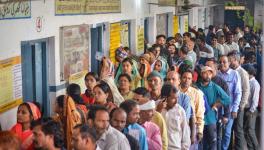Gujarat Polls: Farmers Stopped from Participating in Movement; MSP Lower Than Market Rate
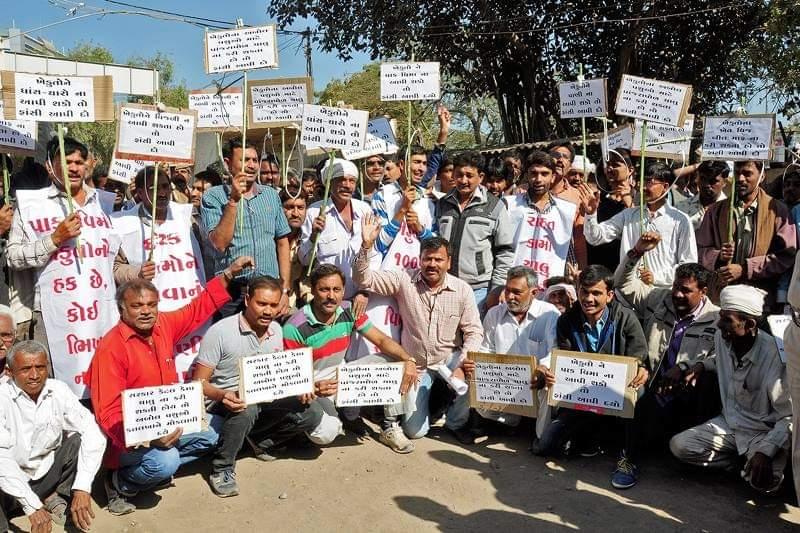
Farmers protesting against the price hike and low earnings Pal (middle) was detained several times for protesting
Banaskantha: “The more we fall into our problems, the more the government has added to them. It is not just the level of groundwater that has been drying up in Banaskantha, it is also the help that we have received from the government,” says Shankar, a farmer from Banaskantha’s Dhanera area.
In North Gujarat’s Mahesana district, the Bharatiya Janata Party had won five seats out of a total of seven in the last election. However, this year, with no solution to the farmers’ problems, Mahesana is likely to see a shift to an Independent or an Indian National Congress MLA. The farmers suggest that in the absence of groundwater, they have not been able to make use of the drip irrigation subsidy that was introduced and heavily advertised by the party.
“How do I get the subsidy? If you know, please tell me,” said Mohan, a resident of Mahesana. He added, “When I cannot even afford to install a borewell in my farm, how do I even make use of the subsidy? Earlier, they at least gave a subsidy for the seeds; this year, we did not receive even that.” Getting a borewell installed on land where there is no water until the depth of 1,000 ft is very challenging for the farmers who have less than five bighas of land.
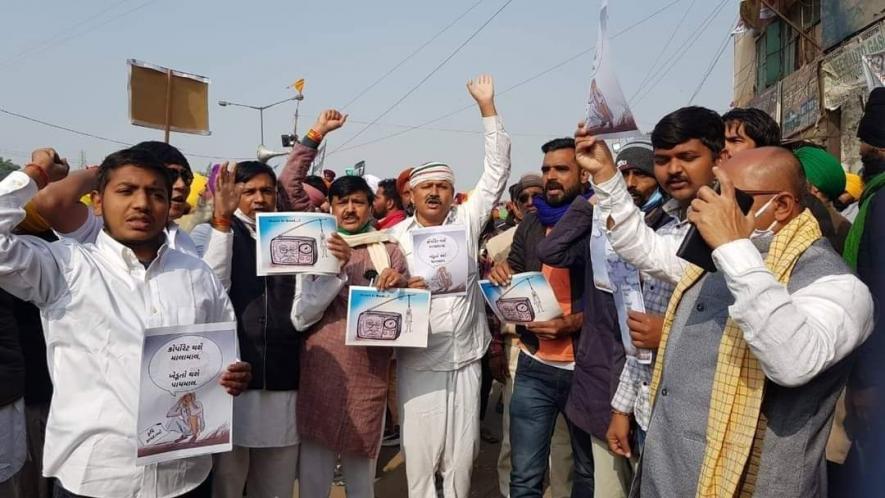
Farmers protesting against the price hike and low earnings Pal (middle) was detained several times for protesting
“Although the government provides MSP for multiple crops, for us, since there is no farming in three seasons owing to the water conditions here, we get it only for two crops: groundnut, and mustard. Even for these, the rates are so low that we fail to sell our crops,” said Shankar. Not just this, the farmers allege that the government has been procuring less than ever. This year, they say, the government procured less than 20% of the total produce.
The farmers find it better to sell their harvest in open markets rather than at the ‘sarkari mandi’. Mashuk Patel, a farmer from Dhanawada village, owns around 20 bighas of land and is a medium-scale farmer. Yet, he is unhappy with the state of the market. “Why will a farmer not sell the crops at a better price?”
There are only two crops that the government procures at the MSP. While the MSP for groundnut is Rs 1,170 per 20 kg, the rate in the market ranges somewhere around Rs 1,200-1,350 for the same. For mustard, the MSP is Rs 1,070 per 20 kg, and the farmer sells it in the market at Rs 1,300. These prices have compelled them to avoid the APMC markets. Naturally, then, procurement by the government has also been less.
Also read: Gujarat Elections: Winning Anand After 25 Years, Can Congress Milk a Victory Again?
The reduction in MSP – as the farmers allege – has taken place over the past two years. It was after the introduction of the farm laws and in between the farmers' agitation at the national capital. With the water problems in North Gujarat and Saurashtra, farmers from Gujarat had made an attempt to participate in the protest. However, the Gujarat police allegedly stopped them from doing so.
By mid-2020, after the pandemic and lockdowns had severely damaged household earnings, agricultural prices had fallen sharply, worsening the situation in agrarian areas. The price of cotton fell to Rs 3,000 per quintal from an average of Rs 6,000 per quintal the year before.
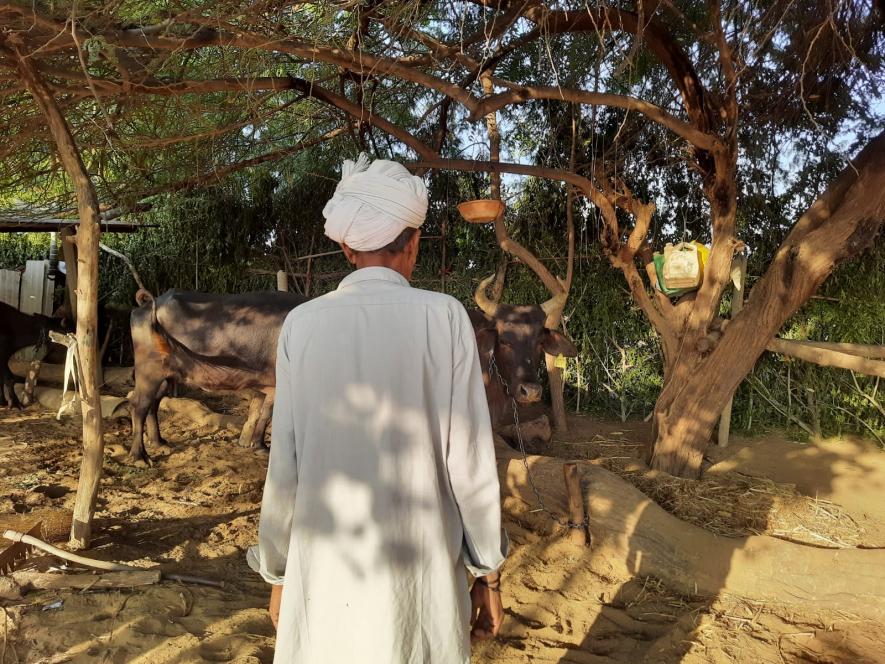
elderly farmer who earlier sowed in all three seasons; now grows only groundnut and mustard
In May 2020, Pal Ambaliya, a lanky 44-year-old farmer leader from Devbhoomi Dwarka who has been fighting for farmers' rights since 2014, went to the Rajkot district collector's office with two other farmers and three cotton sacks to demand better rates for their harvest. However, he was taken to a deserted land, tied to a tree, and beaten up for doing so.
In addition, hundreds of farmers planned on joining the January 26 tractor march by the farmers in Delhi but were stopped by the state police. Shankar, along with at least 50 other farmer friends, had decided to leave for Delhi 10 days before the march. “I had posted on social media that I would be leaving to join the protest soon, but the police became a hurdle,” he said. Early in the morning, as Shankar prepared to lead the way for all farmers to Gandhinagar first and then to Delhi, police arrived at his place. He was allegedly taken to the local police station and detained for several hours. The other farmers, owing to Shankar’s detention, could not leave and several others who attempted were reportedly stopped at the check posts.
“Such is the curb on dissent in Gujarat. We, as farmers, cannot even protest,” said Pal. However, he adopted a different strategy to be able to participate in the protest. “When I heard of Shankar and others being detained and house arrested, I decided to go ahead with a different plan. I left the house after shaving my hair and beard,” narrated Pal.
“I took my tractor towards the Ambaji temple, from where I had to travel within the villages seeking help from the locals. I then had to enter Rajasthan via Aravali,” he said. Once inside Rajasthan, the journey became much easier for Pal and he smoothly reached the Shahjahanpur border. Other farmers who eventually participated in the Delhi protests had to take a train and could not take their tractors.
Farmers also alleged that since the rollout of GST in 2017, it has been easier for people who sell seeds to fool the small-scale farmers with little land and less money. Since the smaller farmers do not understand the tax system and are unaware of how it works on different products, the private parties have been able to fool them with the amount they need to pay – leading to more expense for the farmers.
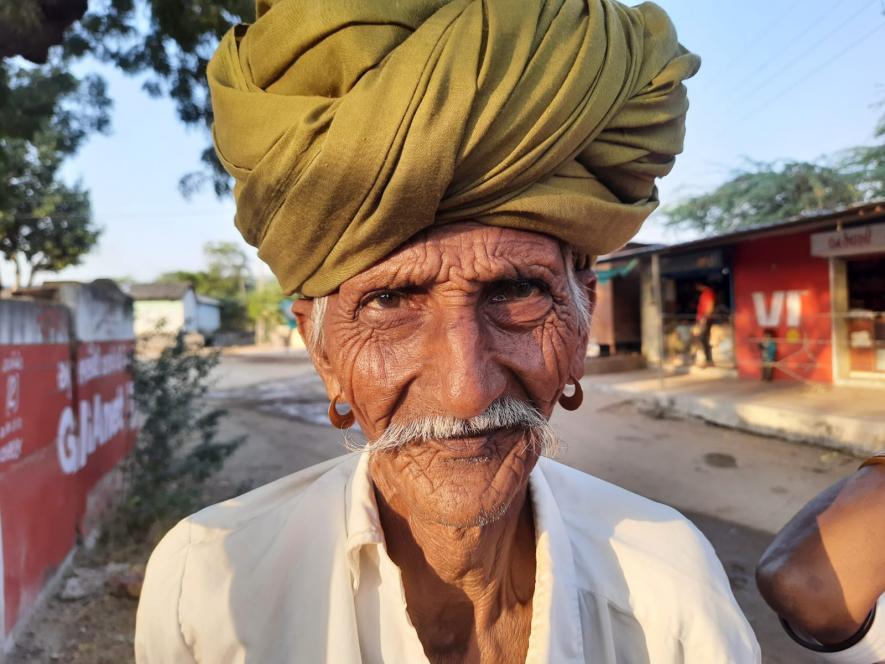
Shankar (65) may have to end farming altogether with no government aid and subsidies
As the elections approach, the farmers are staring at a bleak future in absence of the double income that the regime had promised, the benefits of drip irrigation it advertised, and the MSPs that are of no use to them.
The writer is a freelance journalist based in Delhi and is travelling to Gujarat to report on the Assembly elections.
Also read: Why Are Farmers Marching to Raj Bhawans Today, What Are Their Demands?
Get the latest reports & analysis with people's perspective on Protests, movements & deep analytical videos, discussions of the current affairs in your Telegram app. Subscribe to NewsClick's Telegram channel & get Real-Time updates on stories, as they get published on our website.


















